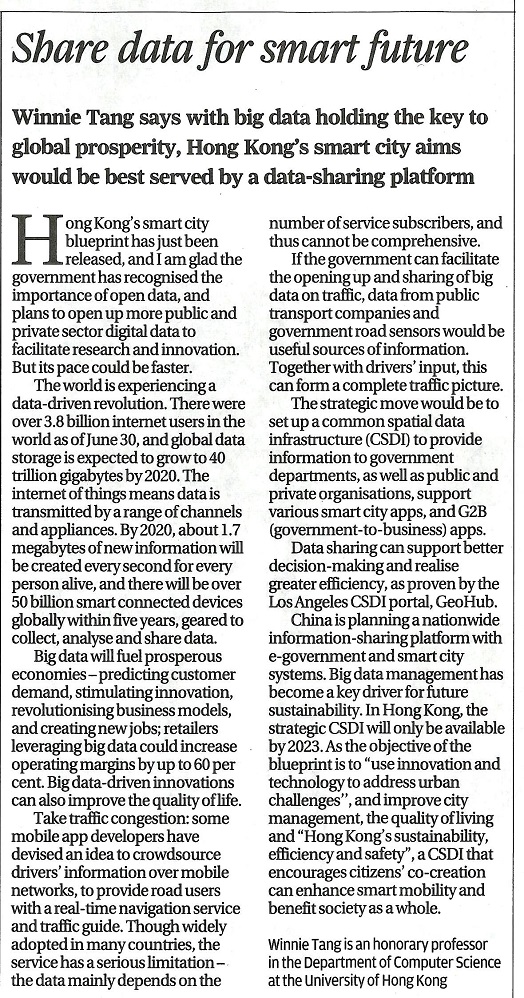網上版請按此

Share data for smart future
Winnie Tang says with big data holding the key to global prosperity, Hong Kong's smart city aims would be best served by a data-sharing platform
Hong Kong's smart city blueprint has just been released, and I am glad the government has recognised the importance of open data, and plans to open up more public and private sector digital data to facilitate research and innovation. But its pace could be faster.
The world is experiencing a data-driven revolution. There were over 3.8 billion internet users in the world as of June 30, and global data storage is expected to grow to 40 trillion gigabytes by 2020. The internet of things means data is transmitted by a range of channels and appliances. By 2020, about 1.7 megabytes of new information will be created every second for every person alive, and there will be over 50 billion smart connected devices globally within five years, geared to collect, analyse and share data.
Big data will fuel prosperous economies – predicting customer demand, stimulating innovation, revolutionising business models, and creating new jobs; retailers leveraging big data could increase operating margins by up to 60 per cent. Big data-driven innovations can also improve the quality of life.
Take traffic congestion: some mobile app developers have devised an idea to crowdsource drivers' information over mobile networks, to provide road users with a real-time navigation service and traffic guide. Though widely adopted in many countries, the service has a serious limitation – the data mainly depends on the number of service subscribers, and thus cannot be comprehensive.
If the government can facilitate the opening up and sharing of big data on traffic, data from public transport companies and government road sensors would be useful sources of information. Together with drivers' input, this can form a complete traffic picture.
The strategic move would be to set up a common spatial data infrastructure (CSDI) to provide information to government departments, as well as public and private organisations, support various smart city apps, and G2B (government-to-business) apps.
Data sharing can support better decision-making and realise greater efficiency, as proven by the Los Angeles CSDI portal, GeoHub.
China is planning a nationwide information-sharing platform with e-government and smart city systems. Big data management has become a key driver for future sustainability. In Hong Kong, the strategic CSDI will only be available by 2023. As the objective of the blueprint is to "use innovation and technology to address urban challenges", and improve city management, the quality of living and "Hong Kong's sustainability, efficiency and safety", a CSDI that encourages citizens' co-creation can enhance smart mobility and benefit society as a whole.
Dr. Winnie Tang
Honorary Professor, Department of Computer Science, The University of Hong Kong